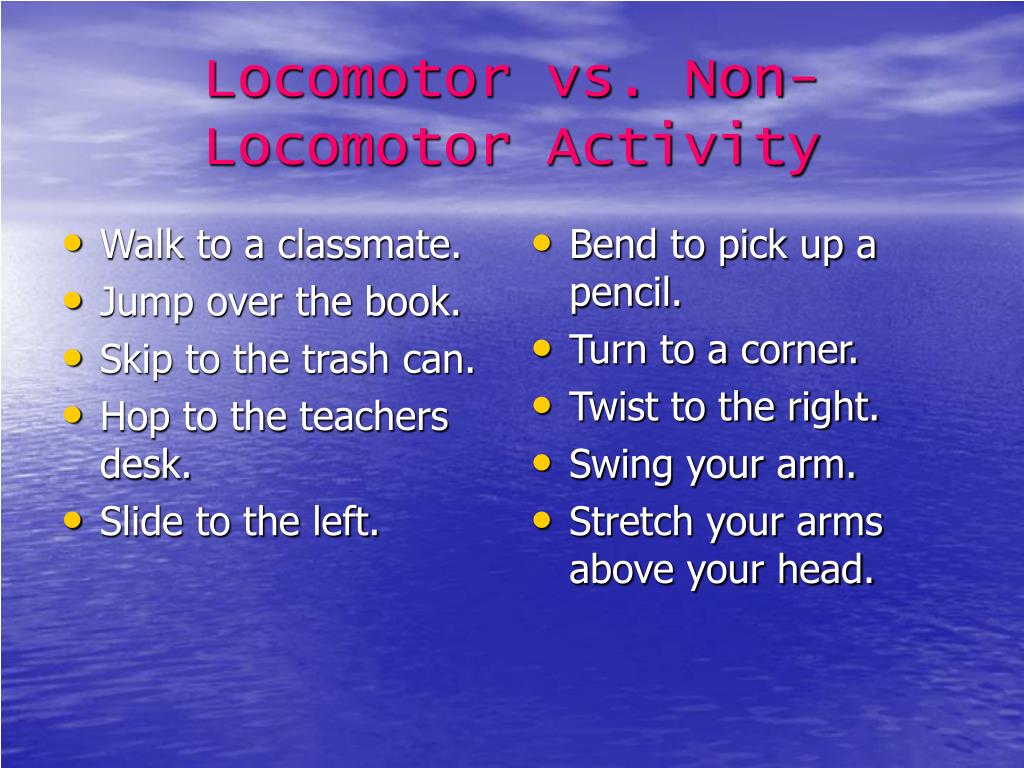
Movement Top 10 Movement Visuals Simple Large Print Design
This video is performed and edited by my sister, Bregeth Jamandron. She wanted to share how non-locomotor movements are executed. This video is made as subje.

Moving Without Moving Incorporating Movement in
Non-locomotor movements are movements that do not involve traveling from one place to another. There are many examples of non-locomotor movements, which include: Bending Stretching.

movements explained! YouTube
Non-locomotor skills encompass a wide range of movements that do not involve traveling, such as bending, twisting, stretching, balancing, swaying, and turning. These skills primarily focus on body stability, posture, and control.

movements Grade7 YouTube
An instructional video for the subject. Watch, like, share, and subscribe!Click the notification bell for more content updates.Monsta Infinitehttps://wn.nr/6.

& Movements YouTube
Non-locomotor movements are movements that are carried out without changing position, that is, only acting in the same position. The position in the locomotor movement is trying to maintain body balance so that it is permanently stable and does not fall. The reason is, the main purpose of doing non-locomotor movements is to train the balance of.

PPT 8 movements 8 movements PowerPoint
A non-locomotor skill is a movement performed while remaining stationary, such as stretching, punching, bending, or swaying. Just as locomotor skills are used to function, non-locomotor skills are.

Non Skills Clipart MiaUnikate
Non-locomotor movement development in childhood is important for balance, flexibility, body control, and spatial awareness. Non-locomotor skill development early in life is predictive of.

“Moving without Movement“ by Pete Charrette
Non-locomotor movements They are anchored, that is, executed around the axis of the body (vertebral column). They occur throughout the body or in parts of it, without there being a trip to another space. The main non-locomotor movements are: Bend It consists in flexing a part of the body.

Movement Display Banners 10 Large Vertical Banners
Welcome to my channel! I'll be explaining the difference between locomotor and non-locomotor movements in this video and provide several examples. Feel free.

POINTING OUT PE Movement capnpetespowerpe
Non-locomotor movement is "movement that moves around the axis of the body (the spine) rather than movement which takes the body through space." Non-locomotor movement is anchored movement. It stays in one place. Basic non-locomotor movements include bend-straighten, twist-turn, swing-rock, push-pull, curl-stretch, and rise-fall.

Movement Top 10 Movement Visuals Simple Large Print
Non Locomotor movement is a movement in which the body doesn't travel What are the examples of Non Locomotor Movements? 1. Balancing 2. Rotation 3. Bending 4.

MOVEMENT VLOG019 YouTube
In today's Physical Education Class class, we will be learning about Non-locomotive Movements Non-locomotive Movements As we have come to learn from our two previous classes, a movement is an act of change in the position or location of something. Movement is the natural way of shifting the body from one place to another. Now try shifting.

NON MOVEMENT
Non-locomotor movements explained! - YouTube 9. Locomotor movements: https://youtu.be/YDHJkBK410cNon-locomotor skills are fundamental body movements that do not incorporate traveling..

Movement Top 10 Movement Visuals Simple Large Print
As for Non-locomotive movements, they are movements that do not involve traveling from one place to another. There are many examples of non-locomotor movements, which include: Bending Stretching Extending Turning Raising Twisting Rotating

and movements YouTube
Non-Locomotors Movements Swing is a pendular motion of a body part that can move forward and backward or side to side. Twist is a partial rotation of body parts around an axis. Turn is a dull rotation of the body around a vertical or horizontal.

What Are Movement Activities Design Talk
non-locomotor movement | NCpedia. noun. any movement that does not travel, but uses the available space in any direction or movement organized around the axis of the body (axial movement); bending, twisting, stretching, and swinging are examples of axial movement. What are the examples of locomotor and non-locomotor movements?